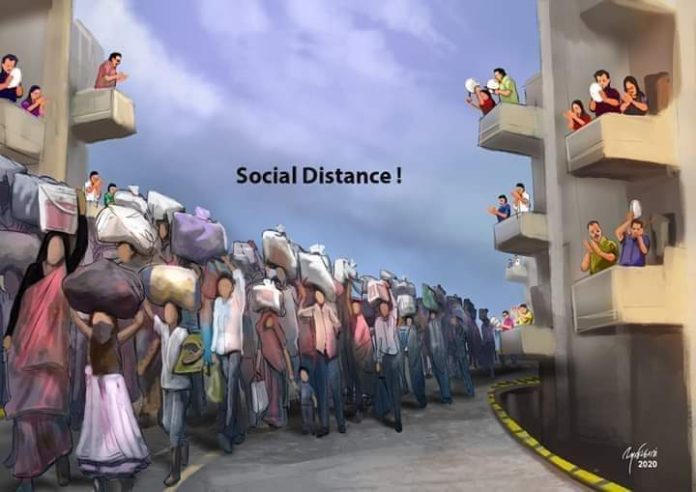By Shimul, TwoCircles.net
The last few days have been hard. When it becomes a choice between holding on and giving up, unlike the vast majority of India, I have the privilege to make a choice between the two. What bothered me in particular was this dawning of realization that this is indeed a rule of the few, and the few will go to any extent to hold on to power, and that really pulled me down. No price is too great as long as it guarantees power.
I saw a video where a woman with a child in one hand and a plastic carry bag with medicines in the other was being beaten up by the UP Police. Her fault? She was visibly Muslim. And the police who was beating her up was a woman.
Tremendous amounts of hatred have been carefully cultivated in large sections of the society – dehumanizing them and those they have learned to hate so much. It is easy to pour this venom down the gullet of a society that is built on the graded inequality of the caste system. As Babasaheb Ambedkar had explained – no one in Indian society can feel equal – they always have to look up to someone or find someone to look down upon, except the Adivasis and the Dalits – the people who carry India on their shoulders.
The other disturbing incident was that of a pregnant woman being denied care in a hospital in Rajasthan because she was a Muslim. An expecting mother was made to lose her child because a society in their new found untouchability has no value for a Muslim life. This is what institutional murder looks like. This is what murder of humanity looks like. Of course none of this is new. There were similar reports of refusing treatment to injured Muslims in hospitals in Delhi riots after Muslim communities were targeted by mobs and police in February. Barely had the blood of Muslims dried on the streets of Delhi, an inhumane lockdown gave several hundred million migrant workers just 4 hours to pack up their little material belongings and march home hundreds of kilometers, unfolding one of the largest crises since the partition of India.

India has always been divided along several fault lines. So it is no surprise to see the rise of the balcony class (mostly upper caste and class) who would step out into their balconies on a moment’s notice to bang on pots and pans, to light candles or – whatever is asked of them by the elites above them, but remain unmoved by the suffering of the millions who build their homes and malls, clean their sewers and grow food to feed them. Reason, science and empathy is conveniently cast aside dutifully by the balcony class to consolidate the power of a few over 1.3 billion people.
Hannah Arendt had written Banality of Evil while covering the trial of the Nazi operative Adolp Eichmann who she found was “terrifyingly normal”. She argues that evil is not always committed by scheming monstrous people, it is also committed as a mundane everyday act by common people. Violence of increasing intensity and reach build upon these banal acts of everyday people. My uncle forwarding fake pictures of Muslim men spitting into Biryani, asking Muslim to go to Pakistan, and more such stereotypical jokes become enablers of larger planned violence. It is no surprise to say that the balcony class has operationalized the banalification of evil.
We see hatred spewed on social media, TV screens, newspapers – the entire information ecology seems to have taken this up as a responsibility to institutionalize hatred against Muslims, Dalits and other weaker sections. We have seen hospitals refusing treatment to the injured, politicians egging crowds to murderous chants, police targeting Muslim homes in UP and Delhi, asking injured citizens to recite national anthem, attacks on volunteers delivering food to Muslim neighborhoods during lockdown, army officer tying a citizen to a jeep as a human shield, people milling around casually around someone being lynched for 18 hours and more that doesn’t catch the national limelight because agents of oppression refuse to report incidents that are likely to be sourced to anyone in the privileged balcony class. All of these acts have counted on the silence or tacit support of the balcony class.
You must have watched scenes of the police singing and gently explaining the benefits of physical distancing to people standing on the balconies of their flats in Bengaluru, Kolkata and other metropolises. You must have also seen the balcony class come out and clap and be on the verge of tears seeing this humane face of the police. “Our police”, they say. And they are right. It is their police. It is not the police of the migrant laborer walking hundreds of kilometers with a child on their shoulder, it is not the police of the Muslim women who have to adopt Hindu names to work as maids in Delhi, they are not the police of the Adivasis who protect their crop land from earthmovers or the people pushing carts laden with vegetables that brings life to the high towers of Mumbai. As if, the skins of these people are meant to display the welts that the police lathi can create or the reactions that a disinfecting chemical, meant for cleaning busses, can have. The disinfecting of the migrant laborers in UP was reminiscent of “disinfecting” Jewish prisoners before entering the concentration camps. And that is what entire states like UP, Delhi, Gujarat, Kashmir have become for Muslims – concentration camps!
But choice is a privilege. Just like the banality of evil, we have to bring forward the banality of compassion and solidarity. How does that happen in a society shaped by centuries of a murderous caste system? No one may have a readymade answer, but one has to be willing to look for it. Ambedkar is one such beacon to have advocated for the annihilation of caste. There are many streams of consciousness within the oppressed people of India who have plausible solutions. But it certainly does not lie with the balcony class. One of our friends who had neither been really involved in activism nor been very vocal told me that she has decided “not to let go of a racist, casteist or communal comment” wherever it might be – in conversations with family and friends or in social media. She gently resists and counters every banal evil comment. This is the least the privileged can do for solidarity and redeeming their humanity.
As the balcony class watches the spectacles of untold human suffering from the amphitheaters of high rises, their humanity dies everyday in their silence, everyday they let their minds be guided by an obnoxious media, everyday they find solace in the fact that a demagogue will protect them from enemies both real and imagined.
An inflection in human history is bound to come as injustices keep piling upon each other. This inflection in human history to redeem the humanity of the oppressed as well as the oppressors, will be led by those who carry the burden of centuries of oppression in their bodies and minds. The banality of good that comes from the few in the balcony class, who refuse to participate in this bloodbath will go down as an important force of solidarity in bringing about the liberation of all.


